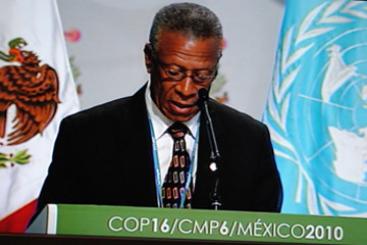Developing nations leave Cancun with dashed hopes
 |
|
Grenada's Prime Minister and Chairman of Alliance of Small Island States (AOSIS) Tillman Thomas spoke for 43 countries, but were his pleas heard? |
Developing countries have left another Climate Change summit feeling their pleas were simply not being heard or listened to by the richer nations most responsible for the world's climate crisis.
After 11 days of talks in Cancun, the major rich countries have again refused to do what the rest of the world most wanted them to, or at least expected.
They again pledged funds and promised to transfer clean technology to developing nations. But billions pledged in Copenhagen hadn't started flowing one year later, leaving very few developing nations optimistic about the latest pledges at Cancun.
The scores of small island states most at Climate Change risk had high hopes for Cancun; now they're finding out, once more, that they were probably just hoping against hope.
But none of that's surprising.
From Day One, the outlook was always bleak. Nothing from Copenhagen had suggested there would or should be high hopes for Mexico – except, perhaps, the hefty US$30 billion pledged to help developing nations resist and adapt to climate change.
The developing nations went to Cancun in all forms – Group of 77, the African, Caribbean and Pacific (ACP) states, the Alliance of Small Island States (AOSIS), the Union of South American Nations (UNASUR), the Caribbean Community (Caricom) and the BASIC group (Brazil, South Africa, India and China). They were also supported by hundreds of organizations, institutions and groups promoting their climate concerns.
But, talk softly, talk loudly, the small island states and other poor developing nations were simply not being heard or listened to – first by the USA, then by Japan.
Japan said it would not sign up to Kyoto a second time, until and unless all other countries signed – including the USA, China and India – and with "comparable" commitments. The Japanese demand was impossible to meet, if only because the USA had already earlier insisted that it will not sign up to Kyoto under any circumstances.
 0
0 







Go to Forum >>0 Comments